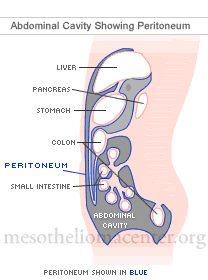Peritoneal Mesothelioma (Abdominal Mesothelioma)
 Malignant peritoneal mesothelioma is an extremely rare cancer. Only 100 to 500 cases are diagnosed in the US each year, making up less than 30% of all mesothelioma cases.
Malignant peritoneal mesothelioma is an extremely rare cancer. Only 100 to 500 cases are diagnosed in the US each year, making up less than 30% of all mesothelioma cases.
Peritoneal mesothelioma is a cancer affecting the abdominal lining, or peritoneum (paira-tin-e-um), which is why is is sometimes referred to as abdominal mesothelioma. This membrane supports and covers the organs of the abdomen.
The peritoneum is made of two parts, the visceral and parietal peritoneum. The visceral peritoneum covers the internal organs and makes up most of the outer layer of the intestinal tract. Covering the abdominal cavity is the parietal peritoneum.
Cells in these linings secrete a fluid which allows organs to move against one another. For instance, as the intestines move food through the body. The cells of the mesothelium are designed to create fluid, but the cancer can cause them to overproduce, creating a build up of excess fluid in the abdominal cavity.
Because pleural mesothelioma is more common and often spreads to the peritoneal cavity, it is important to determine if pleural mesothelioma is the primary cancer.
How does asbestos cause peritoneal mesothelioma?
Although there's no definitive explanation, it is widely believed that asbestos causes peritoneal mesothelioma in one of two ways. First, asbestos fibers may be ingested, and when in the intestinal tract, the fibers may work themselves into the peritoneal cavity and peritoneum. Second, they may be inhaled and transported through the lymph node system to the peritoneal cavity.
Peritoneal Mesothelioma Symptoms
If you are wondering "do I have peritoneal mesothelioma?" you should seek the guidance of your physician immediately; like many cancers, early detection is very important. Malignant peritoneal mesothelioma symptoms may not appear until 20 to 30 years after the first exposure to asbestos. Symptoms are usually not specific to peritoneal mesothelioma, and most often accompany other, less serious medical issues. This may make diagnosing peritoneal mesothelioma more difficult. If you have a history of asbestos exposure, your should have regular check ups with your doctor and an awareness of peritoneal mesothelioma symptoms.
Symptoms of Peritoneal Mesothelioma
Symptoms of peritoneal mesothelioma may include, but are not limited to:
- Ascites
- Ascites is the abnormal collection of fluid in the abdomen; when it is caused by cancer, it is referred to as malignant ascites. A cancer diagnosis is only made in about 10% of ascites cases, and of that 10%, peritoneal mesotheioma makes up only a very small percentage. Ascites can be quite uncomfortable, causing swelling of the abdomen, weight gain, indigestion, nausia, and swelling of the feet and ankles.
- Pain or swelling in the abdomen
- Fluid retention usually causes swelling; solid tumor masses may be responsible for pain.
- Weight loss
- Despite the accumulated fluid, which often increases waist size, a patient's appetite may be aversely affected by peritoneal mesothelioma resulting in weight loss.
- Bowel obstruction
- A blockage in the small or large intestine is a rare, and often late-occuring, symptom of peritoneal mesothelioma.
- Anemia
- A reduction in the number of red blood cells to below normal; this forces the heart and other organs to work harder to get oxygen where it's needed.
- Fever
- Infection is the most common cause of fever in cancer patients, but tumor cells can also produce fever-causing agents. A bowel obstruction may also cause fever.
Peritoneal Mesothelioma Diagnosis
Symptoms of peritoneal mesothelioma are not necessarily unique to the disease, so diagnosing peritoneal mesothelioma requires more than an observation of symptoms. Most symptoms associated with abdominal mesothelioma accompany other, often less serious, medical conditions. Most peritoneal mesothelioma diagnoses are made when the malignancy is in an advantage stage and diagnosis, alone, takes on average four months1.